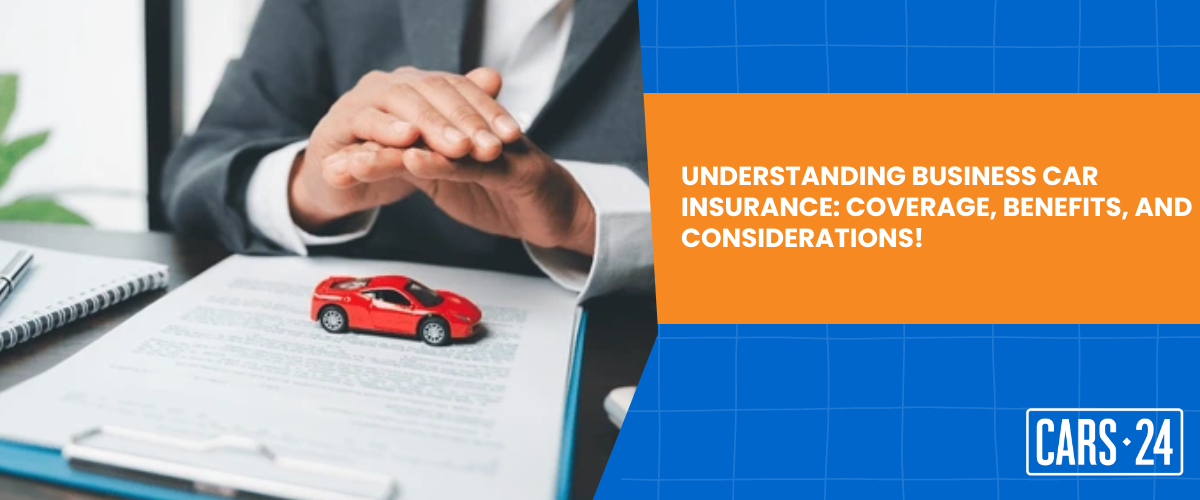Comprehending the complexities of car insurance, especially in the context of business car insurance, can be quite challenging. Initially, one might assume that it refers to a separate insurance product designed exclusively for business purposes. However, the reality is more intricate. Business car insurance is frequently integrated into personal car insurance policies to cover specific business-related activities. This implies that some personal car insurance policies offer the possibility to expand coverage for your vehicle to encompass certain business uses and occasions.
What is Business Car Insurance?
Business car insurance, also called business vehicle insurance, is an insurance policy that offers protection for vehicles utilised for business activities. Depending on your requirements, there are two main methods to acquire business car insurance:
- Personal car insurance with ‘business use’ coverage: This option is suitable if you utilise your personal vehicle for business purposes. It extends your existing personal car insurance to encompass coverage for these business-related uses.
- Dedicated commercial car insurance: This specific type of policy is designed exclusively for vehicles used solely for business purposes. It provides customised coverage that addresses the unique risks associated with commercial vehicle usage.
It is important to understand that business car insurance is distinct from compulsory third-party (CTP) insurance, which is mandatory for all registered vehicles in Australia. The costs of CTP insurance can vary depending on the state and insurance provider.
What sets Business and Commercial Car Insurance apart?
When it comes to insuring vehicles used for business purposes, it is crucial to understand the distinctions between business car insurance and commercial car insurance. Here is a breakdown of the key differences:
Business car insurance
- Business car insurance typically involves extending your existing private car insurance to cover business use. This can be beneficial for individuals who use their vehicles for work-related activities, such as real estate agents or tradespeople.
- However, it is important to note that private car insurance usually does not cover business use beyond commuting to and from your workplace.
- To ensure that your policy covers accidents that occur while using your car for business, it is essential to inform your insurance provider about your intentions.
- Different insurance providers may have varying definitions of what constitutes business use, so it is crucial to clarify this by reading the Product Disclosure Statement (PDS) and Target Market Determination (TMD) of your policy and discussing it with your provider.
Commercial car insurance

Commercial car insurance, on the other hand, is specifically designed for vehicles exclusively used for business purposes. This type of policy is suitable for mobile businesses or businesses that require frequent product deliveries. Some providers even offer commercial car insurance to cover a fleet of vehicles under a single policy. Commercial vehicle insurance policies are broader in scope and can cover various vehicle types, including cars, vans, utes, and heavier or specialised vehicles like forklifts, bulldozers, or tractors.
Choosing the Right Insurance:
When seeking business insurance, it may be advantageous to inquire about insurance packages tailored to specific business types. These packages can potentially be more cost-effective than separate policies, depending on your needs. Understanding the differences between business and commercial car insurance can help you make an informed decision when choosing the right insurance for your business.
What are the common inclusions of Business Car Insurance policies?

Business car insurance offers protection against a variety of risks, such as damage to your vehicle or another person’s property. The level of coverage provided will depend on the options and level of coverage you choose.
Some of the inclusions include:
- Repair costs for damage to your vehicle or third-party property
- Additional protections are available as optional extras, which may increase your premium
- More specialised coverage in comprehensive commercial car insurance policies
Some examples of the coverage include:
- Third-party property damage: Covers damage caused by your vehicle to someone else’s property
- Third-party property damage including fire and theft: Covers damage to others’ property and loss/damage to your vehicle due to fire, theft, etc.
- Comprehensive cover: Includes everything in the above levels, plus coverage for various additional risks, such as:
- Damage to your vehicle even if you’re at fault
- Loss or damage of personal items in the vehicle (subject to limits)
- Loss or damage of tools of trade (subject to limits)
- Replacement of your vehicle with a new one of a similar type in case of total write-off
- Emergency repairs and travel accommodation following an insured event
- Towing and storage costs
- Vehicle hire costs following theft (optional after an accident)
- Settlement of outstanding finance or lease amounts in case of total loss
Variability in Coverage:
Coverage can vary significantly between providers and policies, so it’s essential to review the Product Disclosure Statement (PDS) and Target Market Determination (TMD) for specific inclusions, exclusions, and limits when comparing options.
Here is an overview of what is usually covered in each available level of insurance.
| Level of cover | Comprehensive | Third Party Property | Third Party Fire and Theft |
|---|---|---|---|
| Damage to your vehicle | ✓ | ✗ | ✗ |
| Damage to other vehicles and property | ✓ | ✓ | ✓ |
| Theft and malicious damage | ✓ | ✗ | ✓ |
| Fire damage | ✓ | ✗ | ✓ |
| Storm damage | ✓ | ✗ | ✗ |
| Towing after an accident | ✓ | ✗ | ✗ |
| Loss or damage to personal effects kept in car | ✓ | ✗ | ✗ |
| Emergency transport | ✓ | ✗ | ✗ |
What are some typical exclusions in Business Car Insurance?
The exclusions in a business car insurance or commercial car insurance policy can vary based on the level of coverage you choose and your insurance provider. Some common exclusions may include
- Certain vehicle types and commercial uses, such as taxis, rideshares (though some providers offer rideshare car insurance), emergency vehicles, and heavy vehicles driven by drivers below a specified age.
- Damage or loss is caused when the driver is under the influence of alcohol or drugs.
- Theft or loss if the vehicle was not adequately secured.
- Loss of income or revenue due to an insured event.
- Claims for pre-existing damage, unsafe conditions, or unroadworthy vehicles (unless these factors did not contribute to the incident).
- Damage from general wear and tear.
- Risks covered by Compulsory Third Party (CTP) insurance.
It’s important to review your policy’s Product Disclosure Statement (PDS) and Target Market Determination (TMD) for specific exclusions and limits.
Conclusion
The world of business car insurance can be intricate, but having a grasp on the fundamental disparities and inclusions can assist you in making well-informed choices for your enterprise. Business car insurance provides coverage for vehicles utilised in work-related endeavours, whereas commercial car insurance is tailored for vehicles exclusively used for business purposes. When selecting insurance, it is imperative to take into account the unique requirements of your business and meticulously examine policy documents to comprehend what is encompassed and what is not. By comprehending these facets, you can guarantee that your vehicles and business undertakings are sufficiently safeguarded.
FAQs
1. How can I obtain business car insurance?
You can compare options online or apply directly with an insurance provider. For more complex policies, consider consulting a car insurance broker. During the application process, you’ll need to provide detailed information about your business and the vehicle(s) to be insured. Based on this information, the provider will offer you a quote detailing what they’ll cover and the associated cost.
2. Can I insure a car using a business name?
Typically, the vehicle must be insured under the same name as it’s registered. However, some insurance providers may request the name of the associated business if the vehicle is insured under a person’s name. This information may also be listed on the policy.
3. What is the difference between private and business car insurance?
Private car insurance covers vehicles used for personal purposes, such as commuting. It generally does not cover business activities unless specified. Business car insurance, or commercial car insurance, is designed for vehicles used for business purposes.
4. Is personal or business car insurance cheaper?
The cost of both types of insurance depends on various factors. Adding a business cover to a private car insurance policy may increase the premium, as it can be seen as adding to the risk of needing to make a claim.
5. Is business car insurance mandatory?
While Compulsory Third Party (CTP) insurance is mandatory for vehicles driven on the road in Australia, other forms of business car insurance are generally optional. However, they can be valuable in protecting your business from unexpected costs or disruptions due to vehicle loss or damage. If you plan to become a rideshare driver, it’s important to review your insurance and consult your provider.

Comments
New Comment